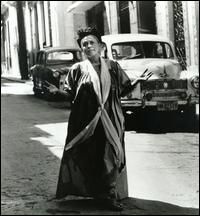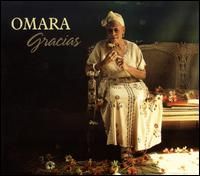
介紹
Omara Portuondo,(歐瑪拉.普同多)(1930—) 古巴音樂界傑出的女名伶,古巴音樂界傑出的女伶,雖然她憑藉早期的作品已在古巴成名,但她引起國際上的矚目還是在1996年參與了德國著名導演維姆·文德斯的記錄片《The Buena Vista Social Club》(樂士浮生錄)音樂專輯和錄影帶的演唱之後。2000年,她發行了第一張獨唱專輯《The Buena Vista Social Club Presents Omara Portuondo》,作為古巴最好的音樂大師她把古巴的傳統音樂呈現給聽眾。1930年出生的 Portuondo歌聲柔和甜美,完全聽不出是一個年逾七旬的老人的歌喉。Omara音色美如佳釀,味道越舊越醇,盡展拉丁及古巴音樂精髓。這次為Omara現場伴奏的樂隊,是在經典的埃格雷姆錄音室與她一起灌錄其最新專輯《Flor de Amor》的原班音樂精英,保證將Omara的完美聲色,原原本本奉上。
作品

發行日期:2000年4月,Elektra
製作人: Jerry Boys, Nick Gold
策劃人: Jerry Boys, Simon Burwell
流派: Latin
2.Flor de Amor
曲目 (14)
發行日期:2004年5月,MCD World Music

策劃人: Ale Siqueira, Flavio DeSouza, Jerry Boys
流派: Latin
3.Gracias
曲目 (13)
發行日期:2008年9月,World Village

1.Yo VI
2.Adiós Felicidad
3.O Que Será (A Flor Da Terra)
4.Vuela Pena
5.Cuento Para un Niño
6.Amame Como Soy
7.Tú Mi Desengaño
8.Cachita
9.Rabo de Nube
10.Gracias
11.Nuestro Gran Amor
12.Lo Que Me Queda por Vivir
13.Drume Negrita
評價
OmaraPortuondo (歐瑪拉·普同多)(1930—)舉止優雅唯美浪漫OmaraPortuondo是Buena Vista Social Club樂團中唯一的女性,也是至今仍健在的團員。談吐舉止優雅的她對於多種風格的歌曲都能詮釋拿捏得很到位,但她最深入人心的還是“Bolero”式情歌,《樂》中她和Ferrer深情對唱情歌《Silencio》(寂靜),唯美浪漫憂傷的歌詞從她醇厚磁性的歌聲中流轉而出,讓每一位聽者都柔腸寸斷。在阿姆斯特丹演唱會上她自己也陶醉在歌曲營造的情景中深受感動,但還是忍到了最後才流淚,於是便有了Ferrer為她輕拭淚水這感人一幕。古巴樂史上是如此形容歐瑪拉的:70年代,古巴情歌的最佳詮釋者。歐瑪拉的情歌,低回中遊動著生命的呼吸,聽者自然地應予性感的、呼之欲出的愛情,那是古巴情歌的魔咒,更是歐瑪拉嗓音的魔咒。 歐瑪拉詮釋古巴情歌之好,語言已不足以形容,引借古巴93歲國寶級樂人賽根多(Compay Segundo)的形容:「歐瑪拉是古巴女性歌者中的『好中之最』。」
by Craig Harris
Omara Portuonda is the grand old lady of Cuban music. While her early recordings made her a star in Cuba, her participation in the 1996 album and video documentary, The Buena Vista Social Club, brought her to international attention. Her solo album, The Buena Vista Social Club Presents Omara Portuondo, released in 2000, reinforced her status as one of Cuba's greatest musical ambassadors.
A native of Havana, Portuondo was one of three daughters born to a baseball player on the Cuban national team and a woman of Spanish heritage who left the comfort and support of her wealthy family home to marry the man she loved. Her parents' singing provided the soundtrack for her early life. As a youngster, she sang in school choirs and music classes.
Heavily influenced by an older sister, Haydee, a dancer at the Tropicana cabaret, Portuondo attended many of the troupe's rehearsals. When the ensemble found itself short one dancer, in 1945, she was recruited to fill the vacancy. The experience launched her on a career as a dancer and she formed a successful partnership with Rolando Espinosa. Portuondo balanced her dancing with singing engagements with friends, including Cesar Portillo De La Luz, Jose Antonio Mendez, and pianist Frank Emilio Flynn, calling themselves Loquimbambla Swing. The group helped to pioneer the filin style of music that blended bossa nova and American jazz. For a while, she also performed with Orquestra Anaconda.
In 1952, Portuondo joined with her sister and Elena Burke to form a vocal group, Cuarteto d'Aida. The group's sound was established with the addition of pianist and director Aida Diestro and female vocalist Moraima Secada. Although she released her debut solo album, Magia Negra, in 1959, Portuondo continued to work with the group.
Cuarteto d'Aida's fortunes were drastically effected by the Bay of Pigs crisis in 1961. Although they had become frequent performers in Miami, FL, they were prevented from returning as the relationship between Cuba and the United States collapsed. While Portuondo returned to her homeland, continuing to perform with Cuarteto d'Aida until 1967, her sister elected to remain in the United States.
Although she performed with Orquestra Aragon in the 1970s, Portuondo had settled into semi-retirement by the mid-'90s. Her plans to slow down her career were altered after Ry Cooder, who was in Cuba recording with the Chieftains, heard her sing in 1995. When he returned, the following year, to produce The Buena Vista Social Club, Portuondo was invited to become a featured vocalist with the all-star group. In 1998, Portuondo recorded a duo album, Desafios, with Cucho Valdes.
